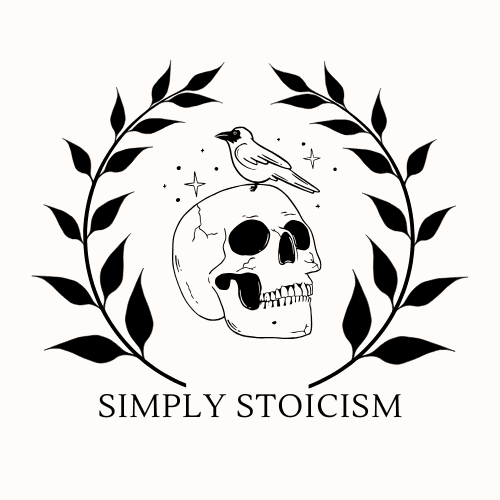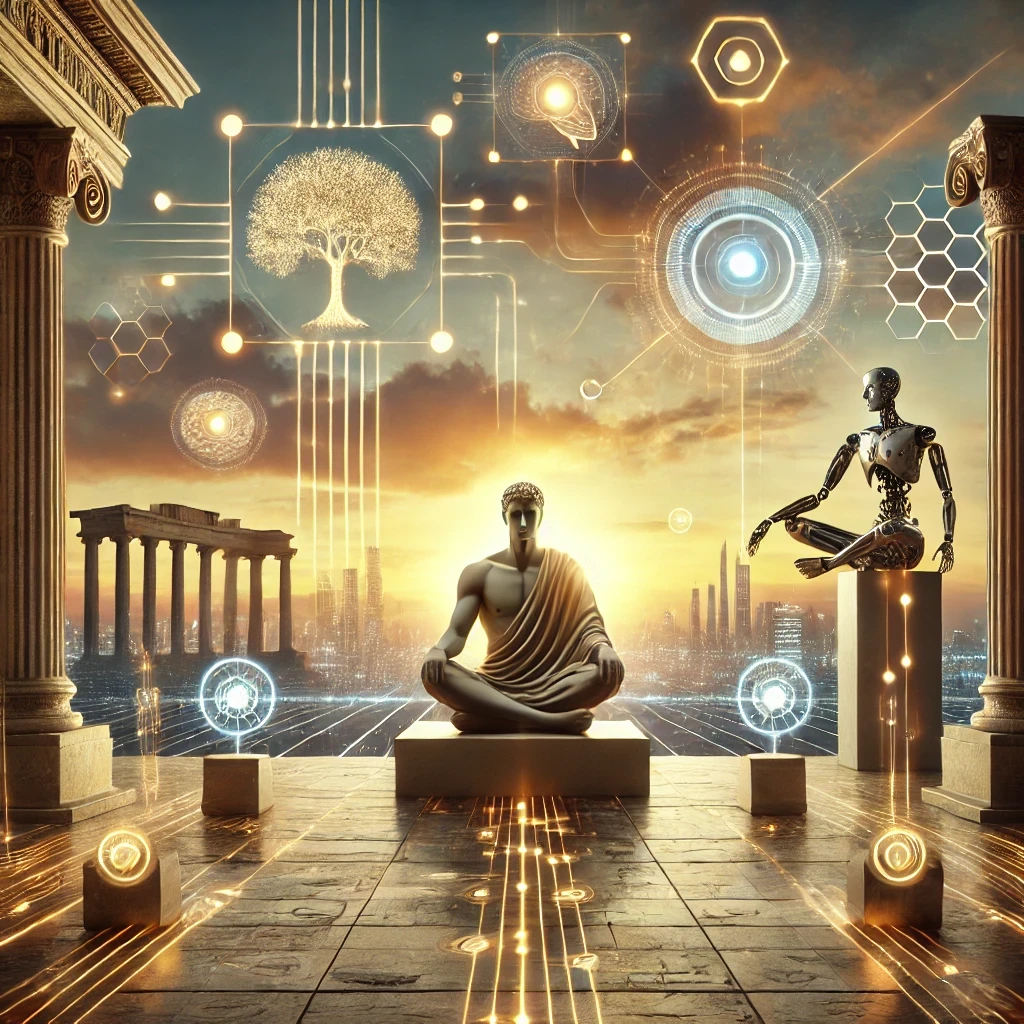Why Stoicism is Your Secret Weapon in the AI Revolution
Learn how ancient Stoic principles can help you thrive in the AI era. Discover practical strategies to overcome AI anxiety and leverage timeless wisdom for future success.

Jon High
·
Dec 6, 2024
Look, I get it. You're tired of hearing about AI. You're exhausted by the endless parade of "experts" telling you how ChatGPT is going to either save humanity or destroy civilization as we know it. The headlines swing wildly between "AI Will Take All Our Jobs!" and "Actually, AI Will Create More Jobs Than Ever!"
(If you're new to Stoicism, check out our What is Stoicism? A No-Nonsense Guide to Ancient Wisdom first.)
Meanwhile, you're just trying to figure out if you should be learning prompt engineering or updating your resume.
But here's what nobody's talking about: The ancient Stoics accidentally created the perfect philosophical framework for navigating this exact moment in history. And no, I'm not about to tell you that Marcus Aurelius had some prophetic vision about artificial intelligence while he was writing his Meditations.
What I am going to tell you is that Stoicism—this 2,000-year-old philosophy practiced by everyone from imprisoned slaves to literal emperors—contains the exact mental model we need to not just survive but thrive in the age of artificial intelligence.
The AI Anxiety Trap
Right now, most people are approaching AI the same way they approach everything else that scares them: they're either:
Obsessively reading every AI article and tutorial, trying desperately to stay "ahead of the curve"
Completely ignoring it and hoping it'll just go away
Stockpiling survival gear for the robot apocalypse
None of these approaches is particularly helpful. And they all miss the fundamental truth that the Stoics understood better than anyone: The only thing you truly control is your response to events.
Just like the Stoics taught us that our problems aren't special, neither is our anxiety about AI.
Let's break this down in a way that would make Epictetus proud (he was the Stoic philosopher who was literally born a slave and still managed to become one of history's greatest teachers).
The Stoic's Guide to AI Anxiety
The core Stoic principle that's most relevant here isn't some complicated philosophical concept. It's dead simple: Focus on what you can control, let go of what you can't. This follows one of the 9 core Stoic beliefs that has stood the test of time - focusing only on what's within our control.
You can't control:
Whether AI will advance exponentially
If your industry will be disrupted
What skills will be automated
How fast change will happen
You can control:
Your response to change
What you choose to learn
How you adapt your skills
The value you create for others
"But wait," you might be thinking, "isn't this just some ancient version of 'don't worry, be happy'?"
Hell no. The Stoics weren't spiritual bypassing hippies telling everyone to just chill out and everything would be fine. They were pragmatic badasses who understood that mental clarity in chaos is a superpower.
The Hidden Advantage of Stoic Thinking in the AI Age
Here's where it gets interesting. The Stoics emphasized something that turns out to be our secret weapon in the AI revolution: human judgment and wisdom.
While everyone else is frantically trying to compete with AI at its own game (processing information, executing tasks, generating content), the Stoic approach points us toward the things AI can't replicate:
Ethical decision-making
Wisdom from lived experience
Human connection and empathy
Value-based judgments
Deep understanding of human nature
These aren't just nice-to-have soft skills. They're becoming the most valuable capabilities in an AI-driven world.
Real-World Case Studies: The Stoic Response to AI Disruption
Let me tell you about Sarah, a graphic designer I know who perfectly embodies what I'm talking about. Last year, when Midjourney and DALL-E exploded onto the scene, her design agency went into full panic mode. Half her colleagues started frantically learning every AI tool they could find, while the other half updated their resumes and planned career changes.
Sarah did neither. Instead, she took the Stoic approach: she focused on what she could control. She started studying how AI tools actually work, not to compete with them, but to understand their limitations. She realized something profound: AI was incredible at generating images, but terrible at understanding the deeper human meaning behind design choices.
Now, instead of trying to be faster or cheaper than AI, she positions herself as an "AI-enhanced designer" who brings human wisdom to the process. Her clients don't just get pretty pictures – they get designs that understand human psychology, cultural nuance, and brand storytelling in ways no AI can match.
Or take Marcus (yes, that's his real name, and no, the irony isn't lost on me), a software developer who watched ChatGPT start writing code. Instead of freaking out, he remembered the Stoic principle of Amor Fati – loving what happens. He started using AI as a coding assistant, which freed him up to focus on the parts of development that really matter: architecture, user experience, and solving complex business problems.
The result? His productivity tripled, and more importantly, his work became more meaningful. "AI handles the tedious parts," he told me, "so I can focus on the truly human aspects of software development."
The Hidden Advantage of Stoic Thinking in the AI Age
Here's where it gets really interesting. The Stoics emphasized something that turns out to be our secret weapon in the AI revolution: human judgment and wisdom. But let's break down exactly what that means in practice.
While AI can process information at incredible speeds, it fundamentally lacks:
Contextual Wisdom
Understanding when to break "best practices"
Knowing which rules matter and which don't
Sensing underlying human needs that aren't explicitly stated
Ethical Reasoning
Making value-based trade-offs
Understanding long-term consequences
Balancing competing human needs
Cultural Intelligence
Reading between the lines in communication
Understanding cultural subtext
Navigating sensitive social dynamics
Strategic Empathy
Anticipating emotional responses
Building genuine human trust
Creating psychological safety
These aren't just nice-to-have soft skills anymore. In an AI-dominated world, they're becoming the most valuable capabilities humans can develop. They're also, not coincidentally, exactly the kind of capabilities that Stoic practices help us develop.
The Three Stoic Practices That Matter Most Right Now
Premeditatio Malorum (Negative Visualization) Instead of being blindsided by AI developments, imagine the worst-case scenarios. Here's how to practice this:
Morning Exercise:
Spend 5 minutes imagining your job becoming completely automated
Picture your industry being disrupted beyond recognition
Envision your current skills becoming obsolete
Then ask yourself:
What would still remain valuable about my experience?
What human elements of my work can't be replicated?
How could I adapt and provide value in this new reality?
Amor Fati (Love of Fate) This isn't about passive acceptance – it's about active engagement with reality. For a deeper dive into this concept, check out our guide on how to love and accept your fate.
Daily Practice:
Each time you encounter an AI tool, ask: "How can this make my work more meaningful?"
When you feel threatened by AI, ask: "What opportunity is this creating?"
Keep a "technological gratitude" journal noting how AI tools free you up for more important work
Dichotomy of Control This is your practical framework for every AI-related decision. Here's how to apply it:
The Control Audit:
List everything worrying you about AI
Categorize each item as:
Fully in my control
Partially in my control
Outside my control
Create action plans only for the first two categories
Practice letting go of the third category
The Stoic's Toolkit for Technological Change
The ancient Stoics had to deal with their own versions of disruptive change. Here's how their toolkit applies to our AI future:
Focus on Character Over Skills
Skills can become obsolete
Character traits like adaptability, wisdom, and ethical judgment only appreciate in value
Invest in developing timeless human capabilities
Embrace the Role of Teacher and Student
Learn from AI while teaching others how to use it wisely
Stay humble about what you don't know
Maintain curiosity about both technological and human nature
Practice Voluntary Discomfort
Regularly use non-AI methods to stay sharp
Don't become overly dependent on AI tools
Build resilience through intentional technological "fasting"
Maintain Perspective
Remember that change is constant
Focus on principles over predictions
Keep human needs at the center of technological progress
The Anti-Panic Approach to Your AI Future
Instead of panicking about AI replacing your job, here's your practical action plan:
Audit Your Current Role
List every task you do
Mark which ones could be automated
Identify which elements require human wisdom
Focus on developing those human elements
Develop AI-Resistant Capabilities
Complex problem-solving
Ethical decision-making
Cultural intelligence
Strategic empathy
Leadership wisdom
Create Value Through Integration
Become an AI-human bridge
Focus on questions over answers
Develop judgment over knowledge
Build wisdom over information
[Previous "Plot Twist" section remains the same...]
Your Next Move
Start with Self-Assessment
What aspects of your work require uniquely human capabilities?
Which of your skills complement AI rather than compete with it?
Where can you add wisdom to automated processes?
Develop Your Human Edge
Study human nature and psychology
Practice ethical reasoning
Build cultural intelligence
Enhance your emotional wisdom
Create Your AI-Stoic Action Plan
List three ways you'll use AI to enhance your human capabilities
Identify three areas where you'll maintain purely human skills
Plan how you'll integrate both for maximum value
Build Your Support System
Find others practicing this approach
Share wisdom and learnings
Create communities of practice
Maintain human connections
Remember: The goal isn't to win against AI. The goal is to remain fundamentally human in an increasingly automated world. The Stoics would argue that this challenge isn't just manageable—it's an opportunity to prove what humans do best: adapt, grow, and find meaning in change.
Want to put these ideas into practice? Start with our guide to 40 Stoic Exercises for Daily Life and begin building your Stoic resilience today.
The future belongs to those who can combine technological capability with human wisdom. The Stoics have been preparing us for this moment for over two thousand years. We just didn't know it until now.
